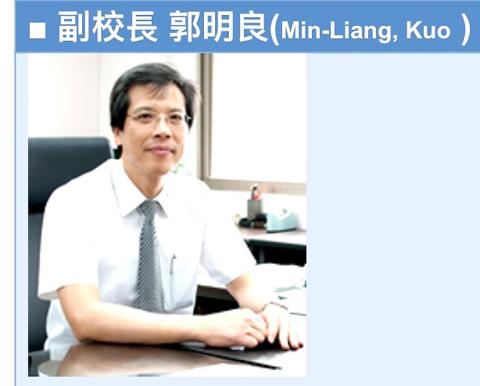National Taiwan University (NTU) professor Kuo Min-liang (郭明良), who has been embroiled in an academic fraud scandal since last month, was yesterday accused of accepting nearly NT$7 million (US$220,105) in exchange for letting other academics be listed as coauthors on papers written by his research team.
The Chinese-language Next Magazine, citing an unnamed source, yesterday reported that from October 2002 to December 2014, Yen Men-luh (嚴孟祿), a doctor at National Taiwan University Hospital’s Department of Obsterics and Gynecology, made 16 check or wire payments to Kuo’s account totaling NT$6.73 million.
Online academic forum PubPeer last month said that Kuo’s team may have forged 11 articles, including four that listed NTU president Yang Pan-chyr (楊泮池) as a coauthor.

Photo courtesy of Kaohsiung Medical University’s Web site
Yen could have acted as a middleman who helped other academics be listed as coauthors in the articles, Next Magazine said.
Minister of Education Pan Wen-chung (潘文忠) yesterday expressed surprise at the allegation.
The ministry will instruct the Department of Civil Service Ethics to investigate and forward its findings to prosecutors, Pan said.
Department of Higher Education Director Nicole Lee (李彥儀) said that the university would submit a report on the allegations by the end of this month.
Although Kuo had tendered his resignation, which is still pending, the government research grants issued to Kuo and his team could be reclaimed if the allegations were found to be true, Lee said.
Yen denied the allegation in an interview with the magazine, saying that he offered to lend the money to Kuo to help him pay a mortgage.
“Even though Kuo is a professor, he had not been in an ideal financial situation,” Yen was quoted as saying.
Yen said that he and Kuo were friends since high school and that he had been providing Kuo with financial assistance.
He said that the bank wires were loan repayments, adding that he has a contract for the loan signed by Kuo as proof.
NTU secretary-general Lin Ta-te (林達德) said the university would launch an investigation.
If Kuo or any other people involved in writing the papers were found to be have accepted bribes, they would be punished in accordance with the rules governing academics and public-school teachers, he said.
Additional reporting by CNA

CHAOS: Iranians took to the streets playing celebratory music after reports of Khamenei’s death on Saturday, while mourners also gathered in Tehran yesterday Iranian Supreme Leader Ayatollah Ali Khamenei was killed in a major attack on Iran launched by Israel and the US, throwing the future of the Islamic republic into doubt and raising the risk of regional instability. Iranian state television and the state-run IRNA news agency announced the 86-year-old’s death early yesterday. US President Donald Trump said it gave Iranians their “greatest chance” to “take back” their country. The announcements came after a joint US and Israeli aerial bombardment that targeted Iranian military and governmental sites. Trump said the “heavy and pinpoint bombing” would continue through the week or as long

TRUST: The KMT said it respected the US’ timing and considerations, and hoped it would continue to honor its commitments to helping Taiwan bolster its defenses and deterrence US President Donald Trump is delaying a multibillion-dollar arms sale to Taiwan to ensure his visit to Beijing is successful, a New York Times report said. The weapons sales package has stalled in the US Department of State, the report said, citing US officials it did not identify. The White House has told agencies not to push forward ahead of Trump’s meeting with Chinese President Xi Jinping (習近平), it said. The two last month held a phone call to discuss trade and geopolitical flashpoints ahead of the summit. Xi raised the Taiwan issue and urged the US to handle arms sales to

BIG SPENDERS: Foreign investors bought the most Taiwan equities since 2005, signaling confidence that an AI boom would continue to benefit chipmakers Taiwan Semiconductor Manufacturing Co’s (TSMC, 台積電) market capitalization swelled to US$2 trillion for the first time following a 4.25 percent rally in its American depositary receipts (ADR) overnight, putting the world’s biggest contract chipmaker sixth on the list of the world’s biggest companies by market capitalization, just behind Amazon.com Inc. The site CompaniesMarketcap.com ranked TSMC ahead of Saudi Aramco and Meta Platforms Inc. The Taiwanese company’s ADRs on Tuesday surged to US$385.75 on the New York Stock Exchange, as strong demand for artificial intelligence (AI) applications led to chip supply constraints and boost revenue growth to record-breaking levels. Each TSMC ADR represents

State-run CPC Corp, Taiwan (CPC, 台灣中油) yesterday said that it had confirmed on Saturday night with its liquefied natural gas (LNG) and crude oil suppliers that shipments are proceeding as scheduled and that domestic supplies remain unaffected. The CPC yesterday announced the gasoline and diesel prices will rise by NT$0.2 and NT$0.4 per liter, respectively, starting Monday, citing Middle East tensions and blizzards in the eastern United States. CPC also iterated it has been reducing the proportion of crude oil imports from the Middle East and diversifying its supply sources in the past few years in response to geopolitical risks, expanding